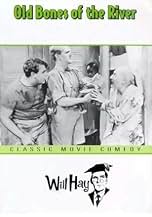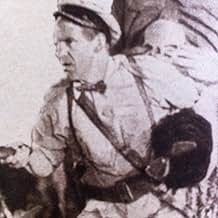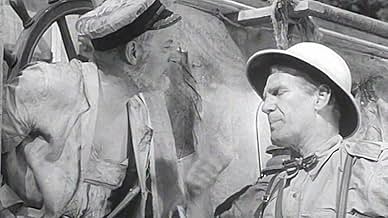In this British comedy, a professor travels up river in Africa to open schools. But his new pupils are not receptive and when the commander of the local base succumbs to malaria, he takes on... Read allIn this British comedy, a professor travels up river in Africa to open schools. But his new pupils are not receptive and when the commander of the local base succumbs to malaria, he takes on his duties too. Aided by the crew of the boat he arrived on he starts collecting taxes fr... Read allIn this British comedy, a professor travels up river in Africa to open schools. But his new pupils are not receptive and when the commander of the local base succumbs to malaria, he takes on his duties too. Aided by the crew of the boat he arrived on he starts collecting taxes from the locals!
- The Voice of Reproach
- (as The Western Brothers)
- Native Child
- (uncredited)
- Native Child
- (uncredited)
- Nativer Child
- (uncredited)
- Native Child
- (uncredited)
- Chief Tahiti
- (uncredited)
- Extra in crowd scene
- (uncredited)
Featured reviews
The timing of Tibbetts' arrival is bad, as the man in charge of the colony is Captain Hamilton and Hamilton soon succumbs to malaria...and the idiot Tibbetts appoints himself the interim leader! And, as leader, he decides to go up river with two other British morons, played by his frequent sidekicks, Moore Marriott and Graham Moffatt, to collect taxes. But the natives don't have money and soon their little steamboat is filled with goats and other 'taxes'.
When the trio arrive at one tribe, however, their timing is pretty bad as they've just had a revolt and their new leader is intent on overthrowing the white overlords. Can these three somehow prevent bloodshed or will they be the first on the chopping block?
Like so many 1930s and 40s films, this one has a resounding pro- colonialism slant. And, if you think about it, the audience SHOULD be rooting for the natives. After all, they are exercising self- determination! And, no doubt a few eyebrows will be raised today in this sort of colonial nonsense. Politically correct it isn't, though it could have been a lot worse and much more racist...not that this is a glowing endorsement!
Overall, this film is pretty much what you'd expect--and is very, very similar to the other Hay, Marriott and Moffatt films apart from the setting and rather heroic actions they take near the end. So, if you like this fast-talking comic, you'll enjoy...and if you don't...well...I have no idea.
The scene is set with the opening caption In Darkest Africa Teaching the black man to play the white man, with the Western Brothers exhorting us all to Play The Game. Seedy quasi-missionary schoolmaster Hay arrives at a British outpost to help civilise the natives, unbeknownst to him bringing with him guns and booze (the white man's burden) that a returning educated native M'Bapi is smuggling in with which to foment trouble. His brother, chief Bosambo the Boot-Licker has a rather disparaging opinion of him! Hay & Co. get lumbered into collecting the native taxes, which lead to many hilarious scenes and classic quips (a lot centring on Hay's views of Harbottle's cleanliness), and eventually friction and war. Favourite bits: the sight of Jerry and Albert snuggled up and snoozing in the top bunk as a strong smell of goats permeates the cabin to wake up Hay below; the suspicions raised as to whether Hay had fathered a black baby; the expert repartee that makes this ultimately so worthwhile, unfortunately amidst many gags that would be considered either racist or racially patronising in todays perfect world.
Not quite a classic as were so many of Hay's films, but for fans still sparkling throughout. If you're not a fan or are too serious you may have a problem with this one!
Second bananas Moore Marriott and Graham Moffatt are the captain and first mate of a tramp steamer, probably the African Queen before Humphrey Bogart took it over. Those two aren't much better at their jobs than Hay is with his. They find a baby abandoned in the bush and their attempts at caring for the toddler make those Three Godfathers look professional.
The final scene is these three doing a Beau Geste like last stand at the colonial fort which has been abandoned because of faulty instructions Hay gives in the first place. It works out better for them than it did for the Geste brothers.
In the Thirties there was a lot of sentiment growing for the United Kingdom to give up its colonial empire. The colonial service was a place to go for folks who couldn't get decent work in the mother country. It didn't always attract the best and brightest. More truth in this Will Hay comedy than some would care to admit. Interesting also that the location for this film is identified as the Gold Coast which became Ghana, the first area granted independence when the British started letting go of their colonies.
The film is a satire of some bad old days, but still fun.
Did you know
- TriviaBased on "Sanders of the River," with Lesley Banks and Paul Robeson.
- GoofsThe vegetation by the river is temperate vegetation, not tropical.
- ConnectionsReferenced in Maltin on Movies (2014)
Details
- Release date
- Country of origin
- Language
- Filming locations
- River Thames, England, UK(Doubled for the African river scenes)
- Production company
- See more company credits at IMDbPro
- Runtime1 hour 30 minutes
- Color
- Aspect ratio
- 1.37 : 1
Contribute to this page




















